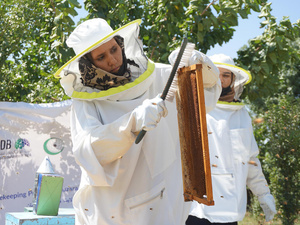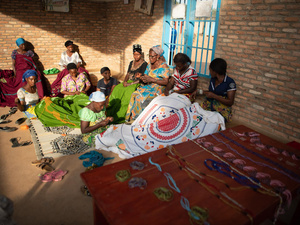Geneva gathering discusses livelihoods for displaced women
Geneva gathering discusses livelihoods for displaced women

Nyaradzayi Gumbonzvanda gives the keynote address at the "Worlds of Women Coming Together" event in Geneva.
GENEVA, February 6 (UNHCR) - A cosmopolitan mix of women from the corporate and humanitarian aid fields gathered in Geneva on Friday to discuss the empowerment of displaced woman through livelihoods.
More than 30 people from around the world attended the half-day "Worlds of Women Coming Together" meeting, co-organized by the UN Refugee Agency and Women's International Networking. Nyaradzayi Gumbonzvanda, general secretary of the World YWCA (Young Women's Christian Association), gave the keynote address.
Other speakers gave presentations on empowering refugee women with disabilities, UNHCR's promotion of a wide range of women's livelihood projects around the world, and the role of the corporate sector, philanthropists and diaspora women in helping empower women through livelihoods.
Gumbonzvanda said her native Zimbabwe was in a state of war when she was born and she had grown up with displacement and exclusion. Today, she said, her country was once more in crisis "and again my family and many women are displaced."
She revealed that from her years of experience and visiting camps in place like Sudan's Darfur region, she had found that protection and livelihoods were top priorities for displaced women.
"It is so dehumanizing to live in a camp for displaced people for more than 20 years and ... wait for a handout to send your kids to school, to look for medicine, to look for food," Gumbonzvanda noted, while adding: "That essence of being able to generate something in your own small way, to care, to nurture, is a profound human need."
Gumbonzvanda said the key benefits of women's livelihoods projects included the possibility of creating "alternative spaces" as well as counselling and therapeutic advantages - "just being involved collectively in an initiative where you can talk about other things."
She said "it's also about developing entrepreneurial skills for self-sufficiency.... Lastly, it's about the actual results, which could be the income, the number of women involved, the benefits to the family, the benefits to the community."
UNHCR's Asia Bureau Deputy Director Pascal Moreau, meanwhile, reiterated the agency's commitment to helping empower displaced women through its Women Leading for Livelihoods (WLL) project, set up two years ago.
She explained that WLL was a fund-raising and awareness tool that enables UNHCR offices, partners and refugee women to plan and execute livelihood projects that otherwise might not have seen the light of day.
It was a relatively small programme due to competing demands and limited financial resources - 28 small businesses have been set up in about a dozen countries, with total donations to date of US$630,000. Projects include a bakery in Serbia, a library and internet café in Morocco, a sewing workshop in Georgia and multi-storey market gardening in Kenya.
"This kind of meeting is very precious for us," Moreau concluded.









